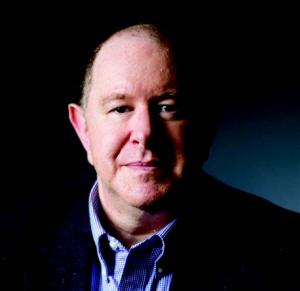By Sarah Kellogg
With nearly daily advances in generative artificial intelligence (AI) and other advanced technologies, traditional intellectual property (IP), and patent laws, the legal academy has scrambled to train enough lawyers to master the fast-changing field of information technology.
GW Law is poised to tackle this ongoing challenge with the soon-to-be-launched Center for Law and Technology to train the next generation of legal professionals in the evolving and burgeoning legal disciplines of cyber, copyright, patent, privacy, and trademark law.
“With the Center, GW will be at the forefront of legal education in privacy, technology, AI, and IP,” said Daniel J. Solove, the Eugene L. and Barbara A. Bernard Professor of Intellectual Property and Technology Law. Solove serves as co-director of the new Center along with Professor Robert Brauneis and Associate Dean for Intellectual Property Law John Whealan.
“Students will have a very rare educational opportunity—one they won’t be able to find at most law schools,” Solove said. “They will have a deep and wide-ranging education that will position them to be leaders in the law of privacy, AI, and emerging technologies.”
GW Law has a distinguished and conversant faculty teaching a globally focused curriculum, as well as pioneering clinical offerings to further student knowledge about laws governing existing and new technologies. Students will also learn how these technological discoveries are changing the face of traditional copyright and patent law.
“We’re at an exciting moment,” said Brauneis, the Michael J. McKeon Professor of Intellectual Property Law. “We’ve got existing concepts of torts, but you need to fit them into a new technology environment. Or it’s a matter of needing new statutes and regulations from Congress and federal agencies to regulate this new field. In both cases, it’s exhilarating to be working in areas where the law is not yet made.”
Drawing on GW Law’s illustrious history in IP, the Center will serve as a hub for scholars exploring how new technologies are pushing the limits of prevailing statutes and rules, while also giving law students a chance to study how government and the legal community grapple with developing new regulations to address novel technologies today and in the future.
“The technology of the last 30 years has changed our society in innumerable ways that have become centrally important today, particularly because they are opening up new areas of the law that have sprung up to deal with the consequences of these new technologies,” said Brauneis, noting regenerative AI, machine learning, and robotics are forcing legal authorities to find answers for some tough questions.
GW Law has a storied history in the field of IP and technology law. Marcellus Bailey, a law graduate of what was then known as the Columbian College Department of Law, filed the patent for inventor Alexander Graham Bell’s telephone in 1876. GW Law alumni also wrote the patents for the Wright brothers’ airplane, Fermi’s and Szilard’s nuclear reactor, Englebart’s computer mouse, and thousands of other inventions.
“GW Law has been a leader in intellectual property and technology law since 1895,” said Dean Dayna Bowen Matthew, the Harold H. Greene Professor of Law. “We’re ranked in the top five consistently among all 200 law schools offering intellectual property and technology courses. Now, we’re going to expand that expertise by incorporating privacy and technology law with a powerhouse faculty. No place in the country will be able to rival our depth of expertise.”
GW Law has already responded to the growth in the landscape of privacy law in recent years, even though it didn’t exist as a named discipline as recently as 20 years ago. Solove said that given that privacy is under assault now more than ever before, it is important attorneys be fully versed in the way personal data is being collected today—from web surfing to financial transactions to buying groceries at the supermarket. By adding scholars, courses, panel discussions, and conferences, the law school has responded to the need for attorneys well versed in the privacy ecosystem for global law firms and companies.
“We’re seeing a dramatic development in privacy law,” added Solove. “Nearly every large law firm has a privacy law practice, and they are looking for graduates who can operate in this evolving environment with skill and confidence. There are plentiful in-house privacy counsel jobs, as well as many positions in government and nonprofits.”
The Center has assembled a robust bench of distinguished faculty to meet the challenge, including longstanding GW Law IP and privacy law stars Brauneis and Solove; F. Scott Kieff, the Stevenson Bernard Professor of Law; and Dawn C. Nunziato, the Theodore and James Pedas Family Professor of Intellectual Property and Technology Law. GW Law also strengthened its expertise in the field this year by adding two respected technology law scholars to its faculty: Mary Anne Franks, the Eugene L. and Barbara A. Bernard Professor in Intellectual Property, Technology, and Civil Rights Law; and Alicia Solow-Niederman, Associate Professor of Law.
Much of the growth in GW Law’s rapidly expanding IP footprint is due to a generous bequest from Eugene L. and Barbara A. Bernard. Their gift helps underwrite professorships and scholarship. “The Bernard’s bequest is a transformative kind of gift for any law school and will enable us to do many things,” said Brauneis, noting the bequest will bring more than $15 million to GW Law.
"Students will have a very rare educational opportunity—one they won’t be able to find at most law schools."
Daniel J. Solove
Eugene L. and Barbara A. Bernard Professor of Intellectual Property and Technology Law; Co-Director, GW Center for Law and Technology
Brauneis said that GW Law students can see the changes in the IP-related legal landscape with a quick review today of Reddit. For example, on Sept. 19, 2023, the Author’s Guild, an organization representing writers, filed a class-action lawsuit against OpenAI, a leading AI research lab. The suit alleges that OpenAI engaged in copyright infringement when it used billions of copyrighted works to train its generative AI model known as ChatGPT. The suit is seeking damages for what it describes as “flagrant and harmful infringement.” Popular fiction writers such as John Grisham, George R.R. Martin, Jodi Picoult, and David Baldacci are among the plaintiffs.
“I’m teaching copyright law this semester, and I told my students at the beginning of the semester that they are studying at an interesting time,” said Brauneis. “In the past, I always told my students that the most interesting time in copyright law was the early to mid-1990s when the Internet was new. Right now, I believe the moment we are in will surpass that time in the 1990s.”
By advancing knowledge and skills through fortified academic scholarship and practical training, the Center ensures GW Law’s practice-ready graduates will continue to stand out in the field and work at the tech giants and global law firms that are writing the rules for this era of technological evolution.
“The job opportunities are growing for our students,” said Solove. “There are more and more laws being enacted every year addressing privacy and technology law, and there’s no sign of a slowdown. Because new issues are popping up like generative AI, the demand for legal jobs is growing nationally and globally.”
The legal landscape today reflects the magnitude of changes required in the law and that will have ripple effects across the globe. More and more law firms are establishing practices in these disciplines, and local, state, and federal lawmakers and regulators look to set boundaries for some if not all of these innovations.
“AI has been percolating for many years, and it has come to the forefront,” said Brauneis. “Our students need to know about the legal implications of an innovation that promises to change so much in society.”
Three Legal Tech Scholars Installed as Endowed Professors
GW Law continued its effort this past year to build a more vibrant community of scholars operating at the intersection of law and technology with the installation of three academic achievers who will educate students about the growing impact of new technologies on the law.
“These scholars will undeniably enhance the educational experience of our students,” said Dean Dayna Bowen Matthew. “We are fortunate to have these globally recognized experts to support and grow the reputation and impact of the new Center for Law and Technology.”
Dawn C. Nunziato
Dawn C. Nunziato, an authority on internet law, free speech, and digital copyright, is the Theodore and James Pedas Family Professor of Intellectual Property and Technology Law. A renowned First Amendment scholar, she is notable for her collaborations across the university, including with the GW Institute for Data, Democracy, and Politics.
Her book, Virtual Freedom: Net Neutrality and Free Speech in the Internet Age (Stanford University Press), is considered significant because it highlighted the dangers of private censorship of online communications, noting they could be as detrimental to society as government censorship.
F. Scott Kieff
The Hon. F. Scott Kieff was installed as the Stevenson Bernard Professor of Law. A globally recognized scholar for his work at the interface of the law, technology, business, and international trade and security, Kieff is a former commissioner of the U.S. International Trade Commission. He was named Fred C. Stevenson Research Professor in the fall of 2012 and the Stevenson Bernard Professor in the spring of 2023.
Kieff’s research, teaching, practice, and consulting work focus on the law, economics, and the politics of innovation, ranging from entrepreneurship and corporate governance, to trade and IP, to medical ethics and health policy.
Daniel J. Solove
Daniel J. Solove, one of the nation's leading scholars in the field of data privacy law and co-leader of the Center, is the inaugural Eugene L. and Barbara A. Bernard Professor of Intellectual Property and Technology Law. The professorship was made possible by a gift from the estate of Eugene (JD ’51) and Barbara Bernard.
Solove is the founder of TeachPrivacy, a privacy and cybersecurity training company that provides computer-based data privacy awareness training. He is an accomplished author and has written numerous books, textbooks, and even a children’s fiction book.







